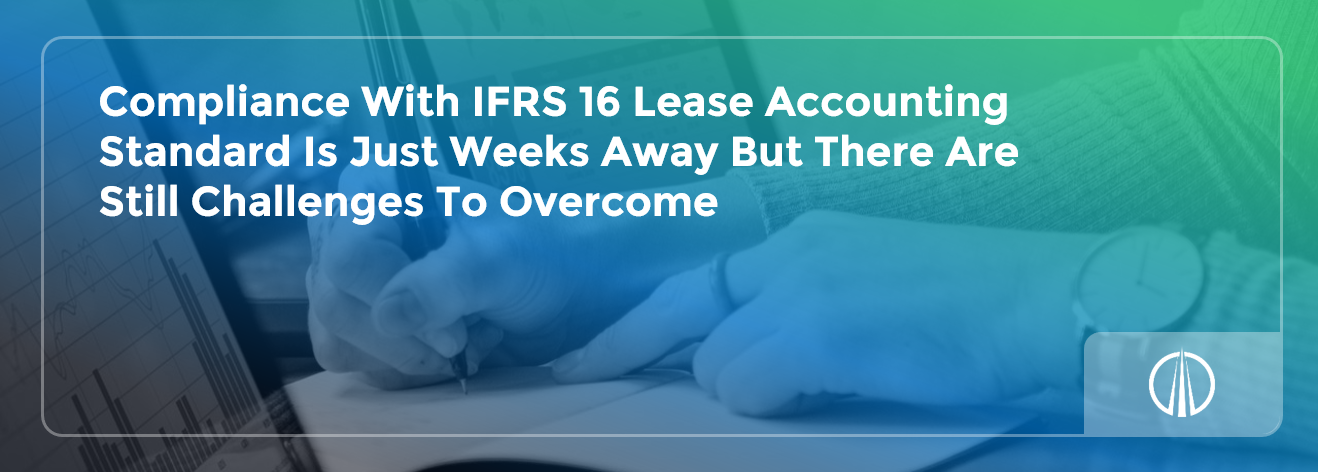Compliance With IFRS 16 Lease Accounting Standard Is Just Weeks Away But There Are Still Challenges To Overcome
Updated 12th May 2021 | 4 min read Published 11th December 2018

Surveys come and go but IFRS 16 is here to stay.
Back in February 2016, The International Accounting Standards Board (IASB), in conjunction with the FASB, published new Accounting Standards for the treatment of leases with the intention of improving on the financial reporting of all lease transactions, including the leasing of aircraft, property or equipment etc.
This improvement would translate into improved transparency of assets employed by companies along with the associated financial obligations and would be implemented by more the requirement to follow more specific directives regarding leases as opposed to the interpretation of the guidelines previously available under the current standards.
“The new guidance responds to requests from investors and other financial statement users for a more faithful representation of an organization’s leasing activities,” stated FASB Chair Russell G. Golden. It ends what the U.S. Securities and Exchange Commission and other stakeholders have identified as one of the largest forms of off-balance sheet accounting, while requiring more disclosures related to leasing transactions.
Throughout the project by FASB and IASB, interested parties were consulted, briefed and involved particularly with regard to the role and impact of Lease Finance and the Financial implications of the changes proposed under ASC 842 and IFRS 16.
With such a tight deadline it is key that organisations understand the challenges and plan to meet and manage them to ensure on-time compliance. A recent survey of some 400 US companies by KPMG showed, similarly to previous surveys including those conducted by Innervision, that the entire process is proving more complex and likely to be more expensive than originally anticipated at the date of IFRS 16 publication (January 2016). With a mix of public (75%) and private companies of which 66% had $1billion + turnovers, the respondents who were very representative of the sector most impacted by IFRS 16 (84% of these were primarily lessees as opposed to lessors) conceded that their portfolios were primarily operating type leases – all of which will need reclassifying under the new standard.
However, the same survey indicates that decisions to conquer these challenges are now finally being taken –
- 54 per cent had now evaluated and selected a lease accounting software solution
- 40 per cent had now completed a lease inventory (assets, commitments & documentation)
- 76% plan to internally estimate the Internal Borrowing Rate (IBR) – well it is a decision!
On the other hand, there were serious shortcomings highlighted and it appears that the work involved is still being underestimated –
- Just 11% of those surveyed had collected and validated leasing data
- An accounting assessment had been completed by less than 20%
- 34% report no progress in designing a software solution
- 24% were unable to confirm the development of system or process requirements
Getting away from statistics it is important to appreciate that to meet the deadlines companies need to –
- Ensure skilled and authoritative internal staff resource is available to oversee the project
- Allocate adequate funds to allow the utilisation of the most appropriate software solution
- Compile an inventory of leases
- Review lease reporting and leasing policies
- Understand the practical expedients and transition relief options available under the new standard and whether they are appropriate for adoption by your business
- Investigate external assistance – auditors or independent consultants
- Understand the extent of embedded leases in any service agreements and vice versa
- Perform an impact assessment – there is software available such as LOIS LLA to allow you to compare one approach with another
- Engage all stakeholders (lenders, auditors, analysts, managers, shareholders and potential investors) in the business by publishing the impact assessment – no surprises on implementation
- Set the IBR internally lease by lease for the portfolio or by contact with the lessor
- Avoid workarounds by preparedness and tackling each challenge
- Spend time and money to complete the transition to compliance – spend wisely as a staggering 33% plus of the companies polled felt that costs for them could now exceed $500,000
In summary, take advantage of the completion of the compliance exercise by building on it post 1st January 2019 and continuing to invest in the people and the software that will allow your business to better and more cost-effectively manage your leases agreements – this will have a payback with reduced extension rentals, managed run-ons and orderly returns.
When transitioning to IFRS 16 the top 4 auditors are recommending that companies consider the adoption and deployment of appropriate lease accounting systems that will help simplify the implementation of either IFRS 16 or FASB ACS 842.
"Following the release of both new lease accounting standards, it’s clear that creating a centralised, electronic repository of all equipment and real estate leases held should be a priority for companies with leased assets."
Sean Torr, Advisory Managing Director and Lease Accounting Services Leader:
Deloitte
LOIS - Lease Accounting is a cloud-based accounting solution that delivers all the transition tools and functionality needed to extract, validate and report on all the critical lease data required for full compliance with both IFRS 16 and FASB ASC 842. Classification of leases, the setting of discount rates, change management and companies that use LOIS to manage and enhance their lease portfolio are able to produce all the accounting information required to accurately complete the financial statements obligatory for compliance; including income statement, cash flow and balance sheet. LOIS will also generate the complex accounting calculations for you.
For further guidance on implementing the new lease accounting standards, we have put together this inclusive guide to transitioning to the new standards – IFRS 16 or FASB ASC 842. Just follow the link below to access the guide.
Disclaimer: this article contains general information about the new lease accounting standards only and should NOT be viewed in any way as professional advice or service. The Publisher will not be responsible for any losses or damages of any kind incurred by the reader whether directly or indirectly arising from the use of the information found within this article.

